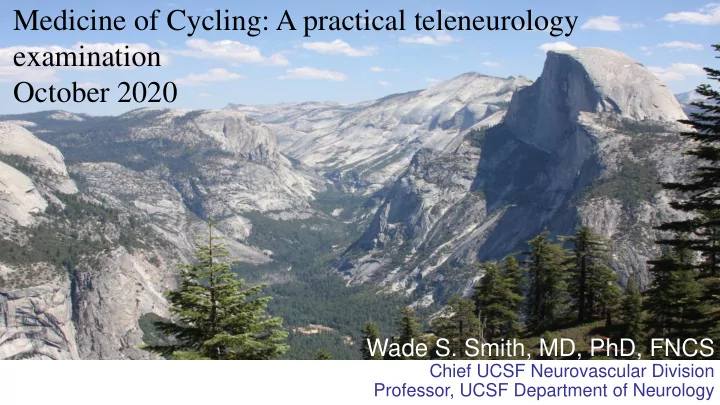

Medicine of Cycling: A practical teleneurology examination October 2020 Wade S. Smith, MD, PhD, FNCS Chief UCSF Neurovascular Division Professor, UCSF Department of Neurology
Disclosures •NIH • U10 NS 086494 (PI) NorCal RCC •Ownership: • MindRhythm, Inc •Stock/Consulting Cerebrotech, Inc Wade S. Smith, MD, PhD, FNCS Chief UCSF Neurovascular Division Professor, UCSF Department of Neurology
Practical Neurological Examination 1) Patient without neurological complaints – “I don’t have a headache” 2) Patient with minor neurological complaints – “I have a headache” 3) Patient in coma – “If I were conscious, I would have a headache” 4) Patient in whom you doubt an organic etiology to their complaints – “If one half of my body wasn’t numb, my headache would be on both sides”
Neurological Examination 2) Patient with minor neurological complaints Perform a screening neurological examination • takes 2 minutes • sensitive for central processes • if normal, it is unlikely a neurologist would find something significant
Mild TBI (concussion) vs moderate or severe TBI • Concussion • More serious injury – Impaired neurological – GCS < 15 function following a head – Deteriorating exam injury, GCS 15, stable exam – Somnolence, stupor – ± LOC, headache, poor – Anisocoria balance, incoordination, – Potential spine injury dizziness, memory loss (retrograde, anterograde), repetitive questions
Neurological Examination: Screening – Alert • Mental Status – Fluent speech, follows commands – Level of consciousness – Orientated to date, DOW, current – Language time – Neglect – Memory (3 items, delayed recall) – Digits forward, backwards – Months in reverse order – Behavior- repetitive questions
Neurological Examination: Screening • Cranial Nerves II- Visual Fields to confrontation III,IV,VI- Pupils, eye movements V- facial sensation VII- Smile, close eyes, look up IX- Palate X- ? Hoarse, swallow XI- Shoulder Shrug XII- tongue
Neurological Examination: Screening • Motor Examination – Pronator Drift – Extensors of fingers and wrist – Dorsiflexors of feet
Neurological Examination: Screening • Gait – Stand, walk on heels & toes and tandem walk – Romberg Test
Neurological Examination: Screening • Coordination – Fast Finger Movements • slow = upper motor neuron • small = extrapyramidal • irregular = cerebellar – Finger-Nose-Finger
Example Exam
Thank You University of California, San Francisco
Recommend
More recommend